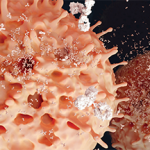NEW YORK (Reuters Health)—Patients with active rheumatoid arthritis (RA) and no known heart disease may have subclinical myocardial inflammation, which improves with disease-modifying therapy, new research shows. “We know that patients with RA have higher risk of cardiovascular events, including heart failure and we really don’t know why. Maybe myocardial inflammation is one of the…

Rheumatology Fellowship Work in Ethiopia Reveals Gaps in Practical Management of Rheumatic Diseases
The first month of my last year of rheumatology fellowship began in Addis Ababa, Ethiopia, at Black Lion Hospital, a tertiary university medical center, where I [Dr. Mary Abraham] started an Emory-sponsored global health rotation. Although a very different beginning to my fellowship year, my experiences at Black Lion reminded me of my passion to…

Rheumatology Patient, Investigator Reflect on Advancements in Lupus, Rheumatoid Arthritis Treatments
In 1969, Martha Lovato passed away from renal failure due to complications of lupus. Martha was 18 years old and survived only two years following her diagnosis. At the time, Martha’s disease was still a mystery to many physicians and researchers. Her treatment options were limited. In fall 2004, after an unprecedented battle with shingles…

Metabolomic Profiles: A Biomarker for the Biological Treatment of RA
A recent study suggests that metabolites may be a biomarker for disease activity in patients with rheumatoid arthritis (RA). For the first time, researchers identified serum metabolomic profiles and 16 clinical parameters that serve as a reasonably predictive model for a patient’s therapeutic response to biological treatment of RA, specifically TNF-α inhibitor therapy…
Statins & the Risk of RA
Statins have anti-inflammatory/immunomodulatory effects that may be useful in preventing rheumatoid arthritis (RA), but previous observational studies about the risk of RA with statin use yielded conflicting results. In this large population-based study, high-intensity statin treatment was associated with a 23% reduced risk of RA when compared with low-intensity statin treatment. This is the largest study on the association of statins with RA risk to date, and the first to assess the effect of relative statin strength…

Mechanistic, Epidemiologic Clues Suggest Possible Link Between Obesity, Inflammation in Rheumatoid Arthritis
Obesity has an established systemic inflammatory component. Could that be a trigger for the inflammation seen in rheumatoid arthritis (RA) and other rheumatic diseases? Although there is no direct scientific evidence, both mechanistic and epidemiologic clues do give some intriguing suggestions of a possible link. “At first, we thought that fat was involved only in…

Rheumatoid Arthritis Research Provides New Insights on Risk Factors, Identification Tools, Intervention
Established wisdom holds that patients with rheumatoid arthritis (RA) will fare better if their disease is diagnosed as early as possible, and treatments with disease-modifying drugs are started before inflammation can do more damage to joints and tissue. Usually, early diagnosis means spotting the clinical signs of disease, but new research tells us more about…

Preclinical Phases of Rheumatoid Arthritis Better Understood
LONDON—Research continues to advance in understanding the causes, prediction and management of the stages of early arthritis before full-blown clinical disease, and an expert highlighted some of the latest of these encouraging findings at the Annual Congress of the European League Against Rheumatism (EULAR) 2016. Many of the genetic and environmental risk factors are known,…

Plasma Cells, Synovial Compartment Implicated in Tenacity of Rheumatoid Arthritis
LONDON—New research shows that the synovial compartment appears to have a special role in the chronic nature of rheumatoid arthritis (RA), providing refuge for plasma cells and giving them an ideal environment in which to produce antibodies against citrullinated protein antigens (ACPA). The findings were presented at the Annual Congress of the European League Against…

Do Fatty Acids Underlie Rheumatoid Arthritis Pathology?
According to a new study, patients with aggressive rheumatoid arthritis (RA) have lower levels of non-esterified fatty acids, which coincide with an enhanced Th1 response. Researchers suggest that lower EPA and DHA at the onset of RA may exacerbate inflammation, and fatty acids may become a novel therapeutic target for the disease…
- « Previous Page
- 1
- …
- 36
- 37
- 38
- 39
- 40
- …
- 76
- Next Page »